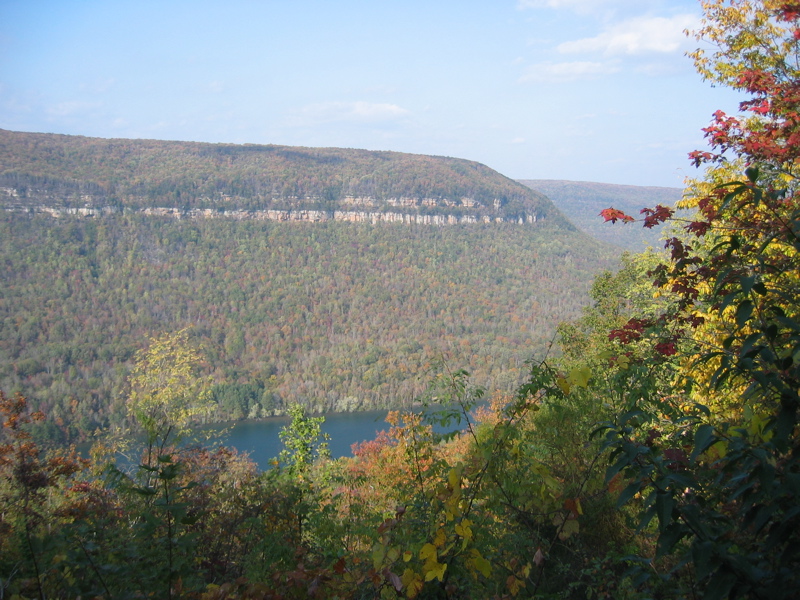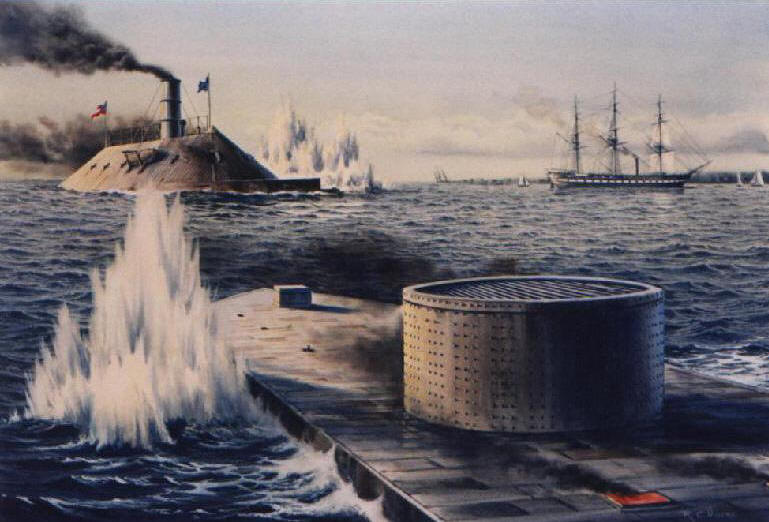Capt. Harlock
Posts: 5358
Joined: 9/15/2001
From: Los Angeles
Status: offline

|
150 Years Ago Today:
For the Confederate Army of Tennessee, it was today or never. They had received the bulk of their infantry reinforcements, and now had an edge of about 65,000 men to the Union Army of the Cumberland's 60,000. If they waited, the Northerners would start to reinforce in turn, and there was a serious danger that the Army of the Ohio would advance from the east and catch them in a pincer. Braxton Bragg altered his plan: he would still begin with an attack on the Union left, but then he would have Longstreet attack the right wing, hoping for a complete collapse. He gave orders that re-organized his army; one wing under Longstreet, the other under Lieutenant General Leonidas Polk.
But he communicated his plans poorly, the first assault began late, and it gained no ground. George Henry Thomas' Yankees had spent the early morning digging in, and were resisting even more strongly than they had the day before. It was evident to all that the Southerners were taking heavy losses:
The battlefield was in a rough and broken country, with trees and undergrowth, that ever since the creation had never been disturbed by the ax of civilized man. It looked wild, weird, uncivilized. Our corps (Polk's), being in the engagement the day before, were held in reserve. Reader, were you ever held in reserve of an attacking army? To see couriers dashing backward and forward; to hear the orders given to the brigades, regiments and companies; to see them forward in line of battle, the battle-flags waving; to hear their charge, and then to hear the shock of battle, the shot and shell all the while sizzing, and zipping, and thudding, and screaming, and roaring, and bursting, and passing right over your heads; to see the litter corps bringing back the wounded continually, and hear them tell how their command was being cut to pieces, and that every man in a certain regiment was killed, and to see a cowardly colonel (as we saw on this occasion—he belonged to Longstreet's corps) come dashing back looking the very picture of terror and fear...
-- Sam R. Watkins, "Co. Aytch" Maury Grays, First Tennessee Regiment
Finally, Longstreet suggested to Bragg that he might gain some ground on the Union right, since the attack on the left was stalled. It was not what Bragg really had in mind, but he judged it better than nothing. As he frequently did, Longstreet organized a powerful assault, and a little after 11:00 A.M., the bugles rang for the move. Now luck turned in favor of the Confederates, and in spectacular fashion. Part of the Union line ran through a wooded area, making the Federal troops there virtually invisible. Alarmed by a report of an apparent break in the line, General Rosecrans pulled the units from a nearby sector and sent them to fill the supposed breach. The problem was that no one ordered any of the reserve troops to replace the ones being moved. Thus an actual gap had been created; and it was at that gap that the Confederate charge struck.
Here was the split of a Northern army that Lee had hoped for at Gettysburg -- and the results were almost as disastrous to the Federals as Lee had in mind. The whooping Confederates rolled up the right wing, taking a number of prisoners and scattering the rest. Another charge collapsed the center as well.
General Leonidas Polk rides up and happening to stop in our front, some of the boys halloo out, "Say, General, what command is that which is engaged now?" The general kindly answers, "That is Longstreet's corps. He is driving them this way, and we will drive them that way, and crush them between the 'upper and nether millstone.'" Turning to General Cheatham, he said, "General, move your division and attack at once." Everything is at once set in motion, and General Cheatham, to give the boys a good send-off, says, "Forward, boys, and give 'em h—l." General Polk also says a good word, and that word was, "Do as General Cheatham says, boys." (You know he was a preacher and couldn't curse.) After marching in solid line, see-sawing, right obliqueing, left obliqueing, guide center and close up; commence firing—fire at will; charge and take their breastworks; our pent-up nervousness and demoralization of all day is suddenly gone. We raise one long, loud, cheering shout and charge right upon their breastworks. They are pouring their deadly missiles into our advancing ranks from under their head-logs. We do not stop to look around to see who is killed and wounded, but press right up their breastworks, and plant our battle-flag upon it. They waver and break and run in every direction, when General John C. Breckinridge's division, which had been supporting us, march up and pass us in full pursuit of the routed and flying Federal army.
-- Sam R. Watkins, "Co. Aytch" Maury Grays, First Tennessee Regiment
Rosecrans had tried to nickname himself "Hold Fast" after the Battle of Stones River, but here, his own headquarters was overrun. The panic infected him and his staff, and they went fleeing back to Chattanooga.
On the already hard-pressed Union left, General Thomas learned from a courier of the shattering defeat, and that he was now the senior commander in the field. Fortunately for the Union, he was equal to the emergency. He drew up a solid new defense line, using the terrain of Horseshoe Ridge. Even so, he and his men might have been overwhelmed if Major General Gordon Granger, commanding Northern reserves three miles (5 km) to the rear, had not deduced from the noise of the battle that something had gone badly wrong and marched three brigades to the rescue. (His orders had been to stay where he was unless ordered to move.)
Although Longstreet ordered the attack to be continued (while he enjoyed a lunch of bacon and sweet potatoes with his staff), Thomas' new position stopped the Rebel advance for the time being -- and forever afterwards, Thomas would be known as "The Rock of Chickamauga". Summoned to Bragg's headquarters, Longstreet asked for more men. Bragg denied the request:
I then offered as suggestion of the way to finish our work that he abandon the plan for battle by our right wing, or hold it to defence, draw off a force from that front that had rested since the left wing took up the battle, join them with the left wing, move swiftly down the Dry Valley road, pursue the retreating forces, occupy the gaps of the Ridge behind the enemy standing before our right, and call that force to its own relief. He was disturbed by the failure of his plan and the severe repulse of his right wing, and was little prepared to hear suggestions from subordinates for other moves or progressive work. His words, as I recall them, were: “There is not a man in the right wing who has any fight in him.” From accounts of his former operations I was prepared for halting work, but this, when the battle was at its tide and in partial success, was a little surprising. His humor, however, was such that his subordinate was at a loss for a reopening of the discussion. He did not wait, nor did he express approval or disapproval of the operations of the left wing, but rode for his head-quarters at Reed’s Bridge. There was nothing for the left wing to do but work along as best it could. The right wing ceased its active battle as the left forced the enemy’s right centre...
-- James Longstreet, From Manassas to Appomattox: Memoirs of The Civil War in America
But Thomas knew, with only half the army, he could not hold his position permanently. As the sun went lower, he ordered a gradual retreat back to Chattanooga. The last fighting of the day gave the Confederates a bonus as three Northern rear-guard units were wiped out.
In captured cannons, ammunition, and supplies, the Southerners had made a rich haul, but the butcher's bill appalled both sides. It was the bloodiest two-day battle of the war, and second only to Gettysburg in casualties. The Union lost 1,657 killed, 9,756 wounded, and 4,757 captured/missing for a total of 16,170, or 27% of Rosecrans' forces. The Confederate losses were even higher: 2,312 killed, 14,674 wounded, and 1,468 captured/missing, totaling 18,454 or 28% of Bragg's forces.
Map by Hal Jespersen, www.cwmaps.com

 Attachment (1) Attachment (1)
< Message edited by Capt. Harlock -- 9/20/2013 2:49:11 AM >
|
 Printable Version
Printable Version
















 After that they tried to take it back. But whatever. I don't know much about the Civil War. Knowing the area, it was easily defensible. Bad logistics I reckon.
After that they tried to take it back. But whatever. I don't know much about the Civil War. Knowing the area, it was easily defensible. Bad logistics I reckon.














 New Messages
New Messages No New Messages
No New Messages Hot Topic w/ New Messages
Hot Topic w/ New Messages Hot Topic w/o New Messages
Hot Topic w/o New Messages Locked w/ New Messages
Locked w/ New Messages Locked w/o New Messages
Locked w/o New Messages Post New Thread
Post New Thread